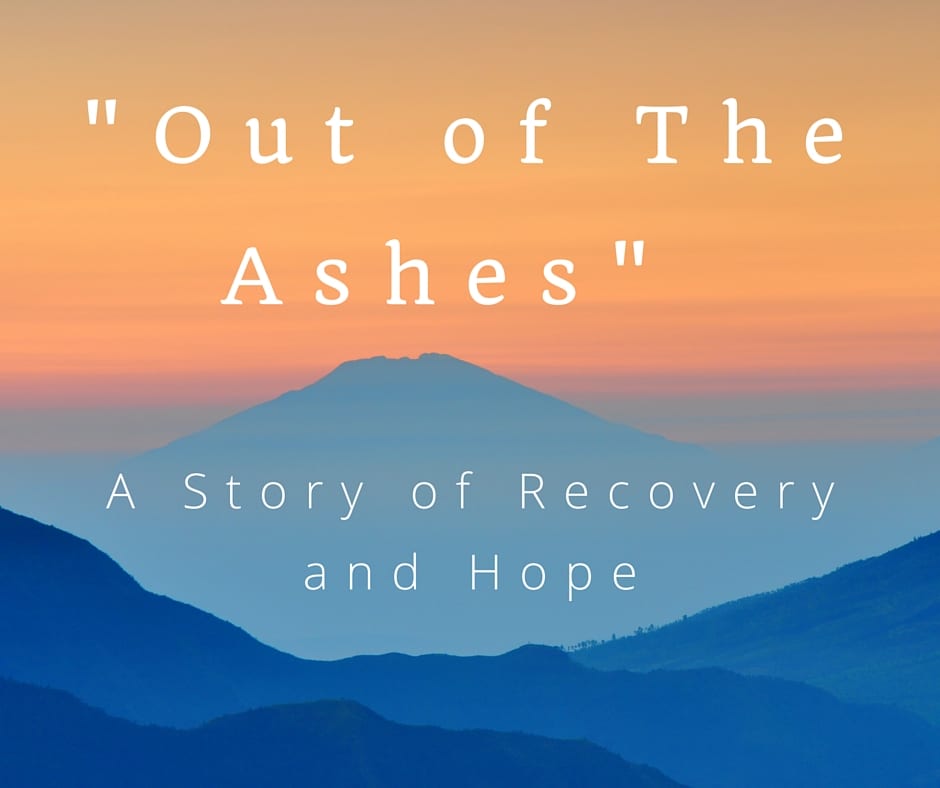The following recovery story comes from Sallie Crotty who writes about her own experiences with a mental health disorder. Sallie takes us on a journey from her first day to her last day at the Menninger Clinic and what she learned about herself and mental health recovery in the process. We are grateful to Sallie for sharing her story with us at rtor.org. –Veronique Hoebeke, Associate Editor
As I wait for my husband to arrive at the Dallas hospital where I have spent the last twelve days, I look at my trembling forty-one year old hands and see my father. I have inherited his hands. Etched with time, the wrinkles are prominent, and the permanent rosy color glows. My eyes shift to my packed bags. I am leaving the hospital and headed to The Menninger Clinic in Houston. Doctors have concluded I am quite sick—on the verge of what feels to me like insanity. My discharge papers report: “Major Depressive Disorder, recurrent; Anxiety, not otherwise specified; and Probable Frontotemporal Dementia.” I feel impossibly complicated.
The Menninger Clinic is world renowned. Many have assured, “You will be in the best possible hands, in the best possible care.” For weeks, I have dreaded my future. At my best, I have decided that I am a worthless wife, mother, daughter, and sister. At my worst, I have foreseen a life in the Texas State Hospital. Over the last few months, people have urged me to “Work! Work!” Since my mind won’t even allow sleep, rest, or a moment’s peace, I have no idea what they mean. I am incapable of organizing my thoughts, much less describing them. My anger and frustration at these words often pushes me further to the edge. The pain is unbearable.
After arriving at Menninger, sitting in the registration office proves awkward. My brother has decided to soldier through this process with my husband. I sense my brother’s anxiety; always his calm, older sister, I feel his fear at my admissions and statements. Once again, the sorrow I have caused my family floods me. I pull my trembling hands under me, and the admission director notes this tensing. The woman who will serve as my psychiatrist, Dr. Harvey, enters the room, smiles, and extends her hand. I offer no smile; my usual friendliness has grown drier with each new mental health professional I meet. Although her sparkly blue eyes and smooth jaw contrast her starched clinician’s jacket, I feel threatened by her, her questions, the impressions of me she must be creating.
“Sallie, I understand you thought this stay would be two weeks,” Dr. Harvey states. I nod, thinking of my children and how they need me. I am particularly worried about missing Kate’s 4th grade ceremony at the end of the year. “We believe you will benefit from a five to six week stay. Your symptoms are complex, and we want you to take full advantage of the treatment here.” These words intimidate me, but my mind has made itself clear: heal or die. Dr. Harvey gently begins to explain what will be occurring during the next few days, the nuts and bolts of my schedule and the meetings with my doctors. She assures me she will be checking in with me again later this week. I feel scared, a bit fearful of what she will discover and ultimately need to share with me.
At the meeting’s end my husband and I walk into the open hallway. I have to tell him and my brother good-bye. I feel like a teenager just dropped off for college. How will I get to know these strangers? Who will comfort me when I am sad? Who will help me to manage the inevitable challenges which lie ahead? With trust and faith, I give each of them a hug, tell them “I love you” and return to my room. The familiarity of my belongings, particularly my favorite pair of jeans and some family photos, offers me some consolation.
The next day I have my first meeting with my primary clinician, Dr. Joe Dickson, a gentle and soft-spoken man. I am immediately struck by how hope fuels his words. I sense he believes I will get better. Having been sick for the last several months, I am uplifted and empowered by his faith in me. He will bridge the gaps between my Menninger life, my family, and my Dallas doctors. He will take intense interest in my education career, my writing passion, church involvement, volunteer experiences, and help me to reflect on the difference I make in many lives. He will also encourage me to explore new work and volunteer experiences when I return to Dallas.
Twice each week, I attend Dr. Allen’s and Dr. Daza’s Trauma Psychoeducation class. They take turns lecturing us about depression, identifying and cultivating our emotions, and what it means to suffer from trauma. When they take questions, both make each patient feel as though they have never been asked that before. They emphasize how “stress pile-up” and “anger turned inward” are the core ingredients of depression and how one can heal from profound pain only through establishing a secure attachment; talking about the enormous challenges; and, finally, living with hope. The idea of “mentalizing,” being aware of mental processes in one self and others, is key. Both doctors also focus on the negative and minimizing effects of using the J word, such as “Just put the past behind you” or “Just stop wallowing in your misery.” Like all the members of my treatment team, they reinforce the idea of self-agency, taking action for a purpose. They teach me that I must be active in my own efforts to recover. While some of the patients’ stories are both gruesome and all-too-real, Dr. Allen encourages us all to reflect on the trauma in our lives. Most of my thoughts center on my father’s alcoholism and some of the dynamics of my childhood.

I first meet the woman who is to become my individual therapist at a pool party for all the patients and staff of the Hope Unit. Dr. Lewis and I immediately hit it off. As I answer her probing questions in our sessions, she nods, and I feel her empathy. My trust in her begins to build, and I realize how much I have internalized the stigma of reaching out for mental health help, perceiving it as a weakness, rather than an act of courage and strength. Dr. Lewis challenges me to consider my marriage and the vision my husband and I have for the second half of our life together. While she acknowledges the deep pain my husband and I had endured only two-and- half years earlier when our son was diagnosed as severely hearing impaired, she pushes me to move out of my personal hiding spaces. “How do you want to grow both personally and professionally, Sallie?” she asks.
During one of my early sessions with Dr. Harvey, she reveals that I am suffering from Bipolar 1 Disorder. Because I have responded well to all the facets of my treatment at Menninger, this is my diagnosis.My hands begin to tremble, and I fire off questions: Will I get sick again? Will I die from this disease? What are the implications of this for my children? She assures me that I will most likely stay well and that another acute, prolonged episode of my Bipolar symptoms—recurrent insomnia, dysphoric mania, deep depression, intense anxiety—is improbable. She commends me for sharing the details with her of the day I tried to commit suicide and reminds me that it was my sickness, not my true self that unraveled me that day. When I return to my room, I pore over the collection of cards I have received from family and friends, and comfort enfolds me.
My natural thirst for learning drives me to begin to discover everything I can about Bipolar Disorder. I ask my doctors questions, listen to other patients’ stories, and throw myself into as much research of the disease as I can. My primary clinician even draws me a picture of what a brain with Bipolar Disorder looks like.
Most of the others had arrived with a diagnosis and are familiar with both the insidious and enriching natures of their illness. I had always had a superficial understanding of Bipolar. A college friend with it could race through sleepless nights and write brilliant papers after a long night of partying while the rest of us looked on enviously. I also knew about the crippling lows and crashes that come with the depressive side of the illness.
I take time to read about the National Alliance on Mental Illness (NAMI) and discover how many Americans suffer from the disorder and demonstrate mostly the same classic symptoms for both mania and depression. The disease is difficult to diagnose, and treatment ideally includes both medications and psychotherapy. It also has a strong genetic link, and while I am at Menninger, the doctors speculate that my deceased father had it.
As my stay at Menninger nears its conclusion, I begin to prepare for my return home. I call my Dallas psychiatrist to arrange a follow-up appointment. One night my peers celebrate my departure with cake and ice cream, streamers, handmade cards, easy laughter. We celebrate the stories of people we know and have read about who have transcended their pain and created new lives. I attend my final meeting with my treatment team; I walk into a room of smiling faces, and my primary clinician, Joe, is humming “Eye of the Tiger” from Rocky 3. This tickles me; I do feel as though I have just left the ring, sweaty and victorious. We exchange hugs, and sad pangs of leaving them wash over me.
My departure the next day is not easy. Expertise, acceptance, and kindness have sustained me the last five weeks, and I am thankful for the privilege of being here. Difficulties lie ahead; I am not naïve. However, anchored by a new strength, I am somehow grateful for the places my mind has traveled and the jagged edges along the way, and the new pilgrimage I have embarked upon. I embrace the possibilities my disease offers me and the relationships born because of it. Hope, faith, and love continue to serve as the greatest medicines.
–Sallie Crotty
Subscribe to our e-newsletter for more mental health and wellness articles like this one.
SUBSCRIBE NOW
Recommended for You
- How a Health Cleanse Can Reset Your Body and Mind - April 16, 2025
- The Truth about Relapse in Addiction Recovery - April 14, 2025
- The Power of Peer Support in Mental Health Recovery - April 10, 2025






Sallie I am so grateful you shared your inspiring and beautifully written recovery story – your resilience, openness, and ability to offer hope to others is remarkable. I particularly liked when you expressed, “I embrace the possibilies my disease and relationships born because of it.”